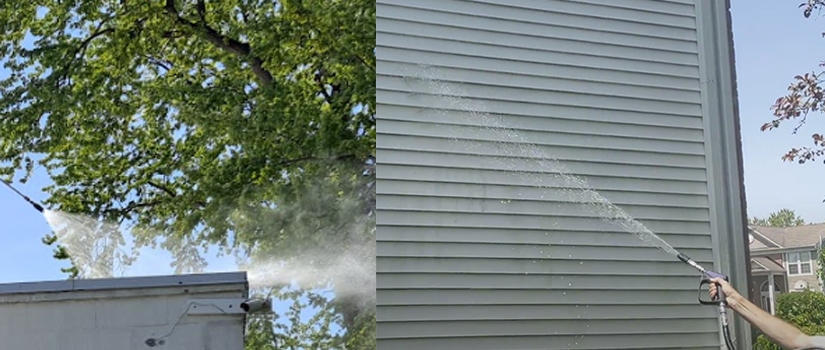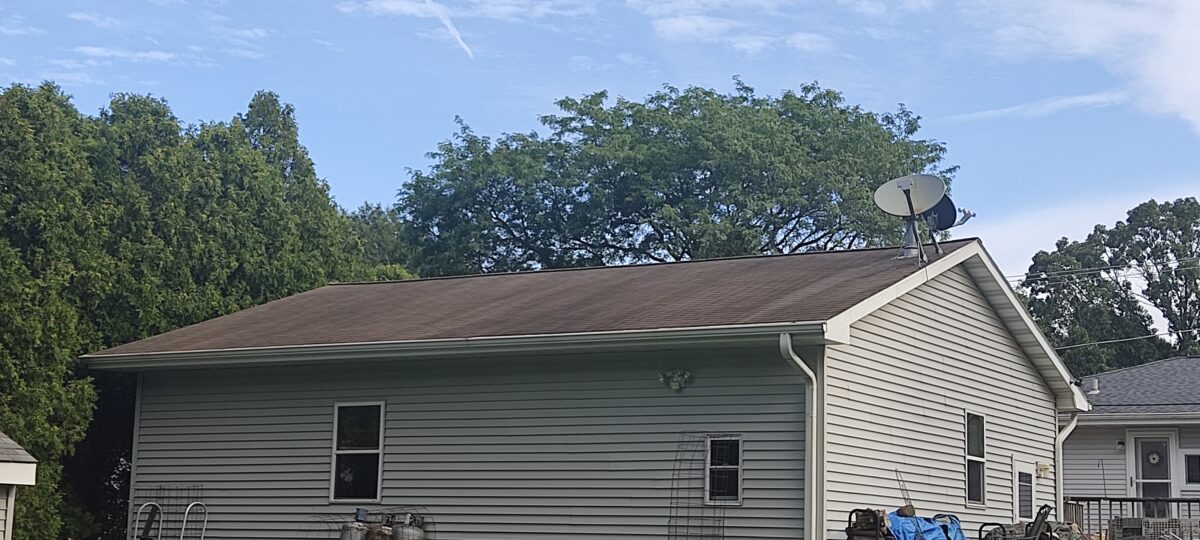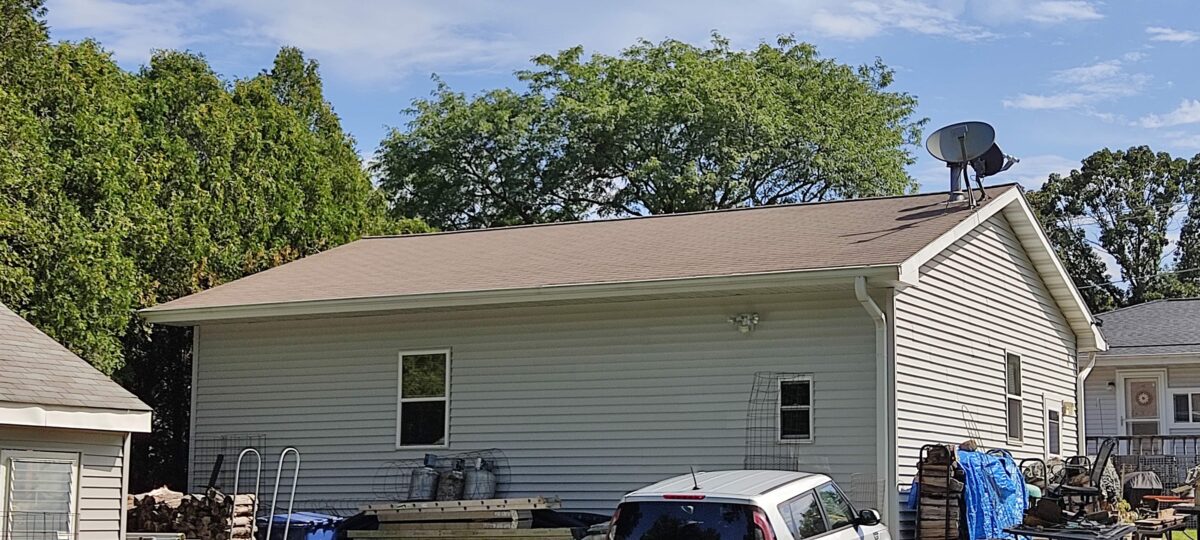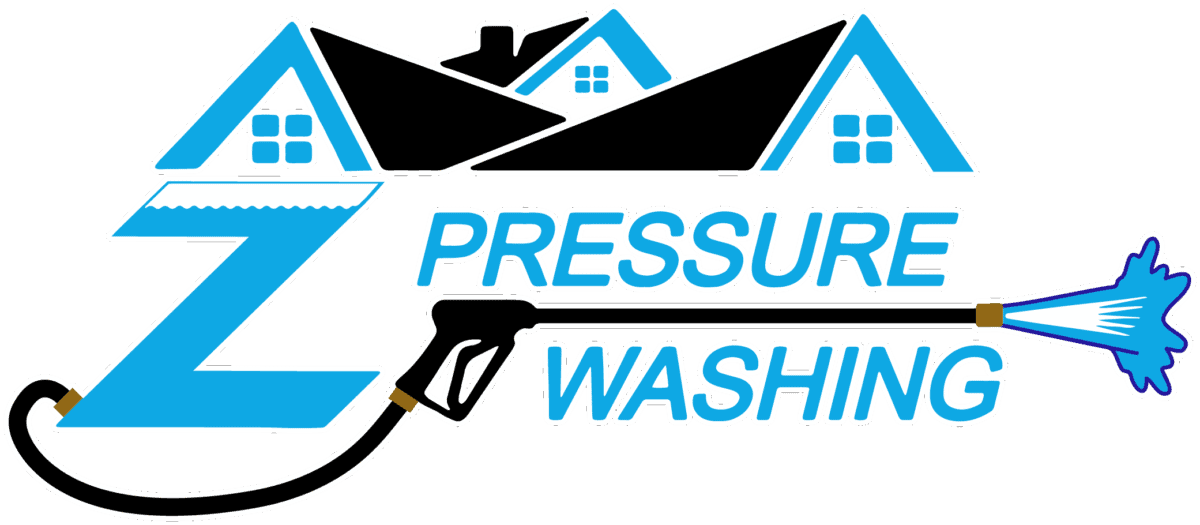
Pressure Washing ————— Soft Washing
Keeping your house sparkling clean is a constant battle against the elements. Dirt, grime, mold, mildew, and algae can build up over time, making your once-vibrant exterior look dull and neglected. When it comes to tackling these outdoor cleaning challenges, two main methods dominate the scene: pressure washing and soft washing.
While pressure washing might be the first technique that comes to mind, it’s not always the gentlest or safest option for your home’s delicate surfaces. That’s where soft washing steps in, offering a gentler yet highly effective cleaning solution.
What is Soft Washing?
Soft washing is a low-pressure cleaning method specifically designed for exterior surfaces on houses. It utilizes a specialized cleaning solution applied with minimal water pressure to remove organic growths like mold, mildew, algae, bacteria, and cobwebs. Unlike pressure washing, which relies on forceful water streams to blast away dirt, soft washing employs a combination of cleaning power and gentle pressure.
The Soft Washing Solution: A Multi-Pronged Attack
The secret behind soft washing’s effectiveness lies in its cleaning solution. This concoction typically consists of three key ingredients:
- Biocides: These disinfectants target and kill organic matter like mold and algae at the root, preventing them from returning quickly. Common biocides used in soft washing solutions include algaecides, fungicides, and mildewcides.
- Surfactants: These act as cleaning agents, breaking down dirt, grime, and other surface contaminants, allowing them to be easily rinsed away.
- Water: The primary carrier for the biocides and surfactants, water also helps dilute the solution to the appropriate concentration for safe and effective cleaning.
The Soft Washing Process: A Step-by-Step Guide
Soft washing may seem like a simple spray-and-rinse job, but there’s a specific process involved to ensure optimal cleaning and minimal risk of damage. Here’s a breakdown of a typical soft washing procedure:
- Preparation: The first step involves protecting your landscaping. This may involve covering plants, shrubs, and flowers with tarps to shield them from the cleaning solution. Additionally, furniture and other outdoor items near the cleaning area might need to be moved away.
- Solution Mixing: A professional soft washing company will carefully mix the cleaning solution according to the specific needs of your home’s exterior. The dilution ratio is crucial for achieving the desired cleaning power without harming surfaces.
- Pre-Wetting: The house exterior is thoroughly pre-wetted with plain water to loosen any loose dirt and debris. This helps prevent the cleaning solution from becoming overly concentrated in specific areas.
- Soft Washing Application: The cleaning solution is then applied to the house exterior using a low-pressure sprayer. The pressure should be similar to a strong garden hose, ensuring a gentle application that won’t damage siding, shingles, or other delicate materials.
- Dwell Time: The cleaning solution is allowed to dwell on the surface for a specific amount of time, typically around 10-20 minutes. This dwell time allows the biocides to effectively kill organic matter at the source.
- Rinsing: After the dwell time, the house is thoroughly rinsed with clean water to remove the cleaning solution and loosened dirt and debris.
Benefits of Soft Washing
Compared to pressure washing, soft washing offers several advantages for cleaning your home’s exterior:
- Gentler on Surfaces: The low-pressure approach minimizes the risk of damaging delicate surfaces like vinyl siding, cedar shingles, and roof tiles. Pressure washing, on the other hand, can easily strip paint, gouge wood, and detach shingles.
- More Effective for Organic Growth: Soft washing solutions are specifically formulated to target and kill organic matter at the root, preventing them from returning quickly. While pressure washing can remove surface dirt and grime, it might not eliminate the underlying mold spores or algae growth.
- Safer for Plants and Landscaping: The lower pressure and controlled application of the cleaning solution minimize the risk of harming nearby plants and landscaping compared to the forceful blasts of a pressure washer.
- Environmentally Friendly: Many soft washing solutions are biodegradable and less harsh on the environment compared to some high-powered pressure washing detergents.
- Longer-Lasting Results: By eliminating the root cause of organic growth, soft washing provides longer-lasting cleaning results, reducing the frequency of cleaning needed.
When to Choose Soft Washing
Soft washing is the ideal cleaning method for a variety of exterior surfaces:
- Roof cleaning: Soft washing is the preferred method for cleaning roofs, especially those made of asphalt shingles, slate, or tile. The low pressure helps prevent shingle damage and the cleaning solution effectively removes moss, algae, and other organic growth that can deteriorate your roof over time.
- Siding cleaning: Soft washing is suitable for various siding materials, including vinyl, wood, stucco, and brick. It removes dirt, grime, mold, mildew, and cobwebs without damaging the delicate surfaces.
- Driveway and walkway cleaning: Soft washing can effectively remove mold, mildew, and algae stains from concrete and paver driveways and walkways, restoring their original beauty without the risk of etching or chipping the surfaces.
- Deck and fence cleaning: Soft washing is a safe and effective way to clean wood decks and fences, removing dirt, grime, and organic growth while preserving the wood’s natural beauty.


Safety Considerations for Soft Washing
While soft washing is generally considered a safe cleaning method, it’s crucial to prioritize safety during the process. Here are some key points to remember:
- Never attempt DIY soft washing: Soft washing solutions often contain biocides that can be harmful if not handled properly. It’s recommended to hire a professional soft washing company like Z Pressure Washing LLC, with trained technicians who possess the necessary equipment and expertise to ensure safe and effective cleaning.
- Maintain a safe distance: Even with the low pressure, it’s important to maintain a safe distance from the spray nozzle to avoid accidental ingestion or inhalation of the cleaning solution.
- Protect your eyes and skin: Wear protective eyewear and clothing to shield yourself from any splashes of the cleaning solution.
The Verdict: Soft Washing – A Gentle Champion for Your Home’s Exterior
Choosing the right cleaning method for your home’s exterior is crucial to maintain its beauty and value. While pressure washing might seem like a quick fix, its forceful approach can often do more harm than good. Soft washing, with its gentle touch and targeted cleaning power, emerges as the clear champion for tackling stubborn organic growth and restoring your home’s exterior to its pristine state. By understanding the process, benefits, and safety considerations, you can make an informed decision and ensure your house receives the gentle care it deserves.
Additional Tips:
- When choosing a professional soft washing company, look for one that is properly insured, and experienced.
- Get reviews from previous clients. Go to there Google profile (If they don’t have one, move on to a company that does. A Google profile is not optional for a legit company.) and read their reviews. Here is what it looks like – https://g.co/kgs/3i5s9MW
- Do NOT shop for the lowest quote, or you’ll get the worst company. Instead get a quote from a company like Z Pressure Washing who has excellent reviews, the technicians are professional and polite, and are fully insured.
- Be sure to inquire about any specific concerns you may have over the safety of certain plants or other items around your home.
By following these tips and choosing soft washing, you can ensure your home’s exterior receives the best possible care, leaving it clean, beautiful, and protected for years to come.


